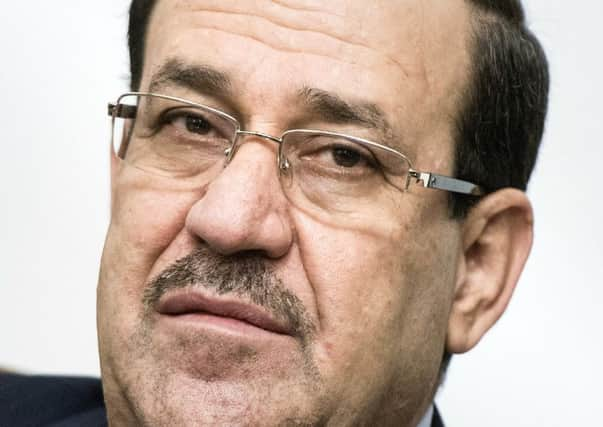Iraq state killings ‘may constitute war crimes’


The group said it found evidence of summary killings by the army and militias in six locations since 9 June. The killings are thought to be brutal retaliation for attacks by the jihadist Islamic State in Iraq and al Sham (Isis), HRW said.
The prisoners were all Sunni Muslims, while the majority of security forces and militia were Shia, researchers said.
Advertisement
Hide AdAdvertisement
Hide AdThe developments came as Iraqi Kurds seized two oilfields in the north, according to reports on the ground.
Most of the executions took place as Iraqi forces fled advancing Isis fighters, HRW said. The killings took place in six Iraqi villages: Mosul; Tal Afar; Baquba; Jumarkhe; Rawa and Hilla.
“The mass extrajudicial killings may be evidence of war crimes or crimes against humanity, and appear to be revenge killings for atrocities by Isis,” HRW said.
Isis insurgents have seized huge swathes of north-western Iraq and declared the creation of an Islamic caliphate spilling over into Syria.
Isis has gained a reputation for “atrocious” brutality. But Joe Stork, HRW’s deputy Middle East director, said: “While the world rightly denounces the atrocious acts of Isis, it should not turn a blind eye to sectarian killing sprees by government and pro-government forces.”
HRW added that the executions, which it documented based primarily on interviews with eye witnesses and officials, “may be evidence of war crimes or crimes against humanity”.
In other developments, Kurdish security forces took over two major oil fields outside the disputed northern city of Kirkuk on Friday and said they would use some of the production for domestic purposes, further widening a split with the central government of prime minister Nouri al-Maliki.
The takeover of the Bai Hassan and Kirkuk oil fields were the latest land grabs by Kurds, who have responded to the Isis insurgency by seizing territory of their own, effectively expanding the Kurdish autonomous zone in the north.
Advertisement
Hide AdAdvertisement
Hide AdThose moves have infuriated Maliki’s government, while stoking independence sentiment among the Kurds.
Kurdish fighters known as the peshmerga – hardened by years of fighting former dictator Saddam Hussein – pushed into the city of Kirkuk, a major hub for the oil industry in the north, and the surrounding area weeks ago in the early days of the Sunni militant blitz.
Until now, they had not moved into the oil fields in the area.
Iraq’s oil ministry spokesman, Assem Jihad, denounced the move as “a violation to the constitution” and warned that it poses “a threat to national unity”.
The Kurdish Regional Government said its forces moved to secure the fields after learning of what it said were orders by officials in the oil ministry to sabotage a pipeline linking oil facilities in the area. It said production would continue, and that staff can return but will operate under Kurdish management.
Production from the fields will be used to fill the shortage of refined products in the domestic market, it said, in a reference to a fuel crunch in the Kurdish region.
It also said the Kurdish regional government will claim its “constitutional share” of revenues from the fields to compensate for Baghdad’s cutting off the 17 per cent of the state budget – some $20 billion (about £12bn) in this year’s projected budget – that is supposed to be given to the Kurdish region.
In recent days, the political divisions between Baghdad and the Kurds have grown increasingly bitter. On Wednesday, Maliki accused the Kurds of harbouring Sunni militants. The Kurds responded by declaring that their politicians will boycott cabinet meetings, renewing demands that Maliki step down.
Advertisement
Hide AdAdvertisement
Hide AdBaghdad, in turn, suspended all cargo flights to the Kurdish region’s two main airports.
And on Friday, Maliki appointed temporary replacements for all five Kurdish ministers in his cabinet, said deputy prime minister Hussain al-Shahristani.
Today, Iraq’s parliament is scheduled to meet for its second session amid calls for the quick formation of a new government that can confront the militants and hold the country together. Maliki, whose State of Law party won the most seats in the elections, has shrugged off calls to step aside.
The US and other world powers, as well as Iraq’s top Shiite cleric, have pressed for a more inclusive government that all Iraqis can rally around.